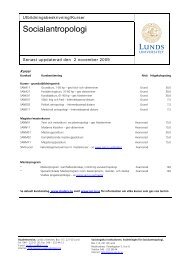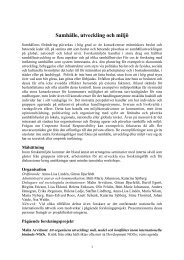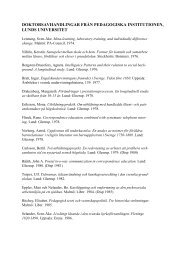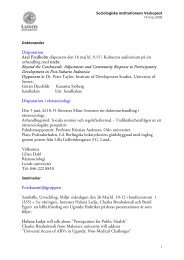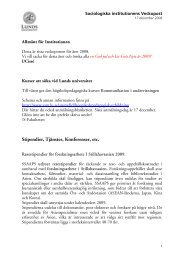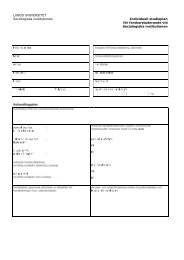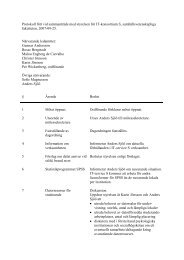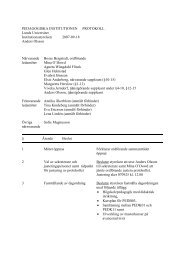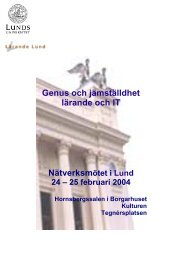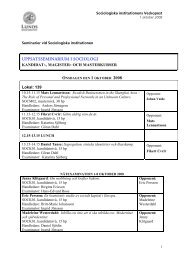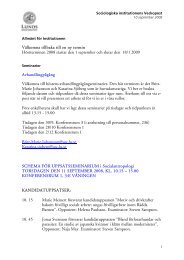Self, Belonging and Social Change
Self, Belonging and Social Change
Self, Belonging and Social Change
Create successful ePaper yourself
Turn your PDF publications into a flip-book with our unique Google optimized e-Paper software.
368 Sociology 45(3)<br />
First, a focus on belonging allows us to study the links between ‘the self’ <strong>and</strong> ‘society’<br />
from the point of view of the person <strong>and</strong>, second, to examine how people engage with<br />
social structures in their everyday lives. Third, a sense of belonging is complex, encompassing<br />
our relational, cultural <strong>and</strong> sensory connections. Fourth, the concept of belonging<br />
lends itself well to the study of social change because our experiences of belonging<br />
are dynamic <strong>and</strong> sensitive to changes. In the ensuing discussion, examples from empirical<br />
studies on belonging from a wide range of disciplines including sociology, geography,<br />
cultural studies <strong>and</strong> design studies are offered as illustration.<br />
<strong>Belonging</strong> Links the Person with the <strong>Social</strong><br />
<strong>Belonging</strong> is here defined as a sense of ease with oneself <strong>and</strong> one’s surroundings. Miller<br />
proposes that belonging is ‘the quintessential mode of being human [... ] in which all<br />
aspects of the self, as human, are perfectly integrated – a mode of being in which we are<br />
as we ought to be: fully ourselves’ (2003: 218), while Baumeister <strong>and</strong> Leary argue that<br />
the need to belong is ‘a powerful, fundamental, <strong>and</strong> extremely pervasive motivation’<br />
(1995: 497). <strong>Belonging</strong> is thus a crucial aspect of being a person: it is ‘fundamental to<br />
who <strong>and</strong> what we are’ (Miller, 2003: 217). <strong>Belonging</strong> involves a process of creating a<br />
sense of identification with one’s social, relational <strong>and</strong> material surroundings (Miller,<br />
2003), or ‘of recognising – or misrecognising – the self in the other’ (Leach, 2002: 287).<br />
As Weeks says: ‘Identity is about belonging, about what you have in common with some<br />
people <strong>and</strong> what differentiates you from others’ (1990: 88).<br />
Thus belonging plays a role in connecting individuals to the social. This is important<br />
because our sense of self is constructed in a relational process in our interactions with<br />
other people as well as in relation to more abstract notions of collectively held social<br />
norms, values <strong>and</strong> customs. These social origins of the self have been the particular focus<br />
of the symbolic interactionist school of thought. The Meadian ‘me’ assumes a set of<br />
social attitudes <strong>and</strong> is consequently able to imagine how a ‘generalised other’ would see<br />
its actions <strong>and</strong> to evaluate these in light of the group’s norms (Mead, 1934), while the<br />
Goffmanian self employs (unwritten) social rules to present a moral self (Goffman,<br />
1959). Bourdieu’s theory of habitus also encompasses these social rules of engagement.<br />
He talks about mastery of ‘the game’within a particular social field – knowing what to<br />
do, how <strong>and</strong> when (Bourdieu, 1977: 161, 1979: 250–1, 330).<br />
A sense of belonging is indeed partly achieved on the basis of knowing these unwritten<br />
rules <strong>and</strong> being able to conduct oneself in an ‘acceptable’ manner before others<br />
(Fortier, 2000). We can make claims for belonging by citing shared underst<strong>and</strong>ings of<br />
who ‘we’ are <strong>and</strong> how ‘we’ behave (Bell, 1999b; Fortier, 2000). Yet what is lacking in the<br />
accounts above is a sense of where these collective rules come from, or how they develop.<br />
As Shotter (1993) argues, a sense of belonging is not built merely on the existence of a<br />
collectively shared culture, but requires also the right to participate in the development<br />
of the ‘living tradition’ or the reflexive arguments of that society:<br />
… that is, arguments about what should be argued about, <strong>and</strong> why. [... ] to be able to feel that in<br />
doing so one is contributing to one’s own world, one must be able to participate in the argument.<br />
(Shotter, 1993: 193)




